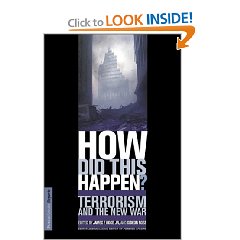We spend half a penny of the taxpayer dollar on foreign aid–we spend 16 cents of the taxpayer dollar on military defense that is useful roughly ten percent of the time. Let me say this in a different way: we spent 32 times more on military weapons and forces useful only 10% of the time, than we do on addressing what George Soros calls “the other axis of evil–poverty, disease and ignorance.”
Several of the articles by folks I admire and respect, are simply off the mark–the article on intelligence, for example, tends to accept the attacks as unpreventable and unpredictable, while failing to note that we have been spending less than 2% of our intelligence budget on terrorism, and that our continuing excesses in technical collection (85% of the intelligence budget) have forced the consistent underfunding of everything else including serious clandestine operations, access to foreign-language open sources, and top-notch analysts who actually have the deep foreign historical, cultural, and language knowledge necessary to make sense of it all. The fact that our intelligence community spends $30 billion a year and more on the 5% of the information it can steal, and less than one half of one percent on foreign language open sources, suggests such a severe imbalance that in a person, this would be called lunacy–instead, we use secrecy to delay a full accounting, and elected politicians who don't know any better tell our citizens that we have the best intelligence we could have had. That is utter nonsense and should be exposed as ignorance at the highest levels about what intelligence can or cannot do.
Others refer to Afghanistan as unconquerable, a view that prevailed within the Administration until Russian President Putin persuaded our President that we could take Kabul before the winter set in. The articles on defense assume that we should spend a bit more on confronting rogue nations, but do not really get into the larger trade-offs, between hard power and soft power, between force and assistance, between state on state and people on people accommodations.
Nowhere in this book, which is excellent and a must read, do we learn of the daunting water shortages that threaten to further destabilize China, Turkey and Egypt, Russia, and other less developed areas already producing plagues, refugees, and corruption. This book addresses terrorism as an annoyance, as something we can deal with if we simply adjust our corporate organization a tad. It does not go deeply into the much larger issues, and rather than suggesting that such readings are available elsewhere (they are not, at least in a single work), I will end by complementing the editors of this work, and suggesting that they go to work immediately on a sequel–only this time, we need a sequel that highlights both the deep conditions of poverty, disease, conflict and ignorance that characterize the world within which we live, and the iconoclastic authorities-most of them not American and none of them “members of the club”-whose views will cause discomfort to those who still think they are in charge.





